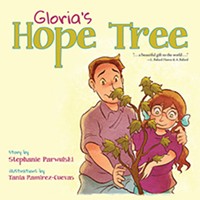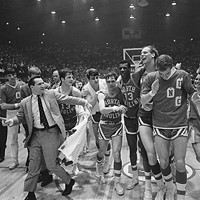Book review: Ron Rash's Burning Bright
It's a rare writer who can capture the underlying emotional feel, the attitudes, moods and ways of seeing, of an entire geographical area. It's particularly hard to pull off when that area is the southern Appalachians. Mountain residents' famous reserve can make them difficult for outsiders to know, just as the mountains' twisting roads, thick woods and many streams can frustrate attempts to get a broad view of that spectacular but haunted land. Very few writers have authentically portrayed southern Appalachian mindsets -- Lee Smith, John Ehle and Sharon McCrumb come to mind -- but from early in his career, Ron Rash has confidently waded into those unforgiving waters and never looked back. His most recent novel, Serena, the book that justly catapulted Rash to national acclaim, was as much a portrait of early 20th century Appalachian thoughts and mores as of its fierce, pitiless title character.
Readers who have sampled more of Rash's work than Serena know he's just as adept at depicting contemporary mountain culture as at capturing its past. In his new collection of short stories, Burning Bright, Rash, who teaches at Western Carolina University, presents tales that range from the time of the Civil War to the present day. No matter the timeframe, Rash's stark imagery and finely sculpted personal portraits convey the kind of conflicted characters -- people easing deep longings by flexing their strong wills amid the region's beauty and poverty -- that mark much of the author's other works.
Burning Bright offers some of Rash's strongest stories yet. Even the shorter pieces pack a wallop. Take "The Ascent," for instance. In it, a boy goes for long treks through the mountains in order to get away from his meth-addicted parents. The parental pair tries to act as if they care for the boy, but when the chips are down, their priorities become as clear as a new glass pipe. Suddenly, that crashed one-engine plane on a nearby mountain seems more appealing to the boy than home. The story itself is simple and the ending's no big surprise, but the tale's power is undeniable, emerging from Rash's spare, driven language, planting the reader into a sudden domestic netherworld that's too weirdly devastating for even the adults to handle.
In the title story, Marcie, a middle-aged widow, becomes so consumed by the unexpected ardor of her second marriage to a younger man, she ignores warning signs about him in order to preserve her hard-won happiness. A grocery store scene featuring a vicious gossip/checkout clerk is a masterpiece of condensed meanness and threat, setting up Marcie's choice between the malevolent town and her shifty new husband. Rash is so careful here with his precise prose as he produces character portraits that ring true, the reader could be forgiven for not noticing the literary craftsmanship.
As Janet Maslin of the New York Times wrote, "Mr. Rash certainly knows how to rivet attention." She's referring to the opening lines of one of the strongest stories here, "Dead Confederates," in which a road worker is talked into a horrendous plan to steal valuable Confederate artifacts from a graveyard. The first sentence -- "I never cared for Wesley Davidson when he was alive and seeing him beside me laid out dead didn't much change that." -- sucks in the reader with a vengeance that doesn't let up till the story's end.
Other stories here are just as strong: "Hard Times," in which a simple case of missing hen eggs leads to a rift and a secret reconciliation between mutually suspicious families. Or "Falling Star," in which a man feels so endangered by his wife's decision to go to community college that he tries to sabotage her efforts, is a story that moves quickly while delving into the region's long history of embarrassment at its "uneducated" image.
Although Rash writes about an ancient region, and salts his characters' conversations with old "mountain" expressions, he is very much a modern writer. Yes, his characters live and die in the Appalachians, with its appeal to those who glorify a "simpler" past, but Rash's graceful prose is polished to a shine, and the perspectives he evinces are sophisticated and unsentimental. The rise of Rash's reputation hopefully bodes well for the future of Southern fiction. Southerners have too long had to slog their way through gauzy renditions of their region's natural beauty and residents' "quaint and cute" ways -- what we call The "Grandma rockin' on the porch, wondering if anybody else wants jis' one mo' he'ping of these butterbeans" School of Southern Writing. Rash proves over and over that writers can be true to the Southern experience without reducing characters to regional caricatures -- and in fact, can create stories and books of national importance and relevance while doing so. If you somehow have missed Rash, check him out. The guy's on a hell of a roll.
Burning Bright by Ron Rash (Ecco, 205 pages, $22.95).
Latest in Books
Calendar
-

WHISKEY TASTING: VIRGINIA HIGHLANDS WHISKY @ Elizabeth Parlour Room
-

NEW WINDOW GALLERY-Pat Rhea-ACRYLIC PAINTINGS-April 05-30 2024 VALDESE, NC 28690 @ New Window Gallery/Play It Again Records
- Through April 30, 12 p.m.
-
An Evening With Phil Rosenthal Of "Somebody Feed Phil" @ Knight Theater
-
Kountry Wayne: The King Of Hearts Tour @ Ovens Auditorium
-

Trap & Paint + Karaoke @ Zodiac Bar & Grill
-
Jessica Moss Makes the Gantt Center a Safe Zone for Local Artists 2
Flipping the script
-
Halo 4 earns critical hallelujahs
Plus, news on Mass Effect Trilogy, LEGO: The Lord of the Rings
-
Shaking it up in The Next Room, or The Vibrator Play 1












